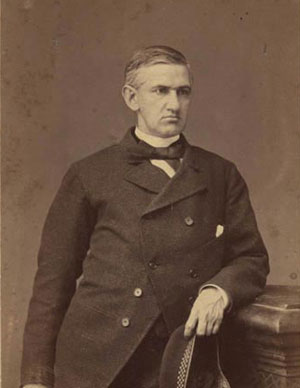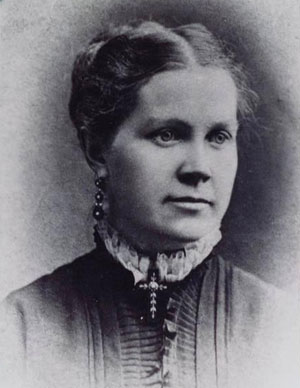
When Peace like a River
#840 in Glory to God
In 1870, Horatio and Anna Spafford had a nearly perfect life. They were financially secure, they owned valuable property in the booming, young city of Chicago, He was a senior partner in a prestigious law firm, and they had four little daughters. They were friends with the internationally famous evangelist D. L. Moody, and had been founding members of the Fullerton Avenue Presbyterian Church. They were very respectable, upper-middle-class Presbyterians. Their family life looked perfect.
Then in October of 1871, life changed for the Spafford family. The Great Chicago Fire destroyed much of the young city and most of the properties they owned. Much of the city south of their neighborhood was in ruins and over 100,000 of their neighbors were now suddenly homeless. Even though their own home was spared up in the mostly rural area near where Wrigley Field is today, all around them was the chaos of the fire and masses of people trying to survive the beginning of winter with no homes, no jobs, and a great deal of fear. It must have been like living in a war zone. Then less than two years later, the Panic of 1873 threw the entire western world into financial turmoil and recession. At about the same time, Anna developed health problems, possibly related to the stresses of the previous few months. The family still had some money and Horatio decided they needed to get away from Chicago. The family made plans for a two-year tour across Europe.
The Spafford family and several friends arranged to travel by train to New York City and then take a ship to Europe. They were planning on meeting their friend D. L. Moody in London where he was preaching. At the last minute, a business matter forced Horatio to remain in the United States for a few days. He sent Anna and his daughters on ahead and told them that he'd join them in England as soon as he could. His wife and daughters boarded the luxurious French steamship the Ville du Havre to begin their vacation.
Their ship never reached Europe.

In the middle of the Atlantic Ocean, the ship carrying Anna and her daughters was accidentally hit by another ship. The Ville du Havre sank in just twelve minutes carrying 226 men, women, and children to the bottom of the ocean. Among those lost were all four of the Spafford girls. Mrs. Spafford miraculously survived and was picked up by another boat and taken to Wales. Once on land, she sent a telegram to Horatio in Chicago. It read in part, "Saved alone what shall I do?"
Horatio quickly arranged to join his wife. He was devastated, and as he tried to make sense of his loss he turned to poetry to process his grief. How does a believer process so much loss, so much pain, so much anger, so much unfairness? How do we go on when all we have worked for is wiped out? In time, he answered his mourning with the words,
"When peace, like a river, attendeth my way,
When sorrows like sea billows roll;
Whatever my lot, Thou hast taught me to say,
It is well, it is well with my soul."
Horatio understood that in good times and in bad times, in great sadness as well as in great happiness, God is with us.
For many of us the COVID-19 crisis has interrupted what we once considered normal. Most of us have not seen our friends or been able to attend school or church for months. Many people around the world have died from this disease, many more will die. Some of us are terrified. Most of us are worried. Around the planet, every business, every government, every city, every school, and every church will be changed. What will our lives be like a year from now?
This poem didn't bring back the perfect life Anna and Horatio had back in 1870. It didn't bring back their security or their pleasant upper-middle-class homelife. It certainly didn't bring back their little girls. Horatio's poem and now the hymn we sing from his words teaches us and assures us that nothing in life or in death can separate us from the love of God.
Never forget that God loves you, and so do I.
Stu Smith
The Text
When peace like a river attendeth my way,
when sorrows like sea billows roll,
whatever my lot, thou hast taught me to say,
it is well, it is well with my soul.
Refrain:
It is well with my soul;
it is well; it is well with my soul.
Though Satan should buffet, though trials should come,
let this blest assurance control,
that Christ hath regarded my helpless estate,
and hath shed his own blood for my soul.
Refrain:
He lives; O the bliss of this glorious thought.
My sin, not in part, but the whole,
is nailed to the cross and I bear it no more.
Praise the Lord, praise the Lord, O my soul!
Refrain:
Lord, hasten the day when our faith shall be sight,
the clouds be rolled back as a scroll,
the trumpet shall sound and the Lord shall descend;
even so, it is well with my soul.
Refrain:
Horatio G. Spafford, 1876.
The Hymn
A Version for This Pandemic

From the Rev. Stu Smith: My first visit to Camp Carew was when I came under care of the Presbytery of Southeastern Illinois at a meeting held at camp in 1987. I was ordained and served in Chicago for over 25 years. I received my Doctor of Ministry Degree from McCormick Theological Seminary in 2001 with a concentration in Religious Education. My doctoral thesis was Out of the Church Basement and into Cyberspace: Internet-Based Religious Education for Youth.
In 2014, I moved back to my family farm in Vermilion County. I'm very proud to be associated with Kemmerer Village and Camp Carew and the powerful ministry with young people that they provide.

Camp Carew welcomes campers from all religious traditions.
Camp Carew is a drug- and alcohol-free environment.


